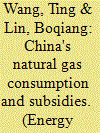|
|
|
Sort Order |
|
|
|
Items / Page
|
|
|
|
|
|
|
| Srl | Item |
| 1 |
ID:
127279


|
|
|
|
|
| Publication |
2014.
|
| Summary/Abstract |
China's natural gas consumption is growing rapidly and it has being driven by economic growth, industrialization and urbanization. In addition, the country's low-carbon development strategy, government-controlled gas price, and some other factors also contribute to the surging gas consumption. This paper studies China's natural gas consumption in residential, industrial and commercial sectors. We adopt the cointegration test and error correction model to study the relationships of explanatory factors and gas consumption of different sectors and climate factor is included into the analysis. In order to find the direction of natural gas pricing reform and establish the benchmark gas price, this paper also estimates the size of gas price subsidy by using price-gap approach. Our findings are as follows: In the long term, China's residential sector is more sensitive to price than the other two. Urbanization is an important factor promoting industrial and commercial gas consumption. Prices of other energies have an influence on natural gas consumption significantly due to the substitutability between energies. The slow-moving and unsatisfying pricing reforms on refined oil and natural gas lead to positive price elasticity of natural gas in the commercial sector, which implies that a further energy price reform is still stringent for China.
|
|
|
|
|
|
|
|
|
|
|
|
|
|
|
|
| 2 |
ID:
127280


|
|
Financial analysis on the proposed renewable heat incentive for: a case study on the solar thermal system
/ Bakar, Siti Hawa Abu; Sukki, Firdaus Muhammad; Iniguez, Roberto Ramirez; Munir, Abu Bakar, Yasin, Siti Hajar Mohd, Mallick, Tapas Kumar, McLennan, Campbell, Rahim, Ruzairi Abdul
|

|
|
|
|
| Publication |
2014.
|
| Summary/Abstract |
This short communication paper focuses on the renewable heat incentive (RHI) scheme in the United Kingdom (UK); and in particular, on its implication on domestic installations of solar thermal systems (STSs). First, a short review on the STS in the UK is provided. Then, a detailed description of the RHI is discussed. A financial analysis is presented afterwards, analysing the impact of the RHI scheme on the applicants, in terms of the net present value and the internal rate of return. From the financial analysis it has been found that the RHI scheme for domestic installations is only attractive if a longer period of RHI payment, i.e. 17 years, or a higher RHI rate i.e. £0.32 per kW h is implemented. The current proposal from the UK government is not financially viable, and as a result, it may hinder the penetration of domestic solar thermal systems in the residential sector in the UK.
|
|
|
|
|
|
|
|
|
|
|
|
|
|
|
|
| 3 |
ID:
127277


|
|
|
|
|
| Publication |
2014.
|
| Summary/Abstract |
Why do people sometimes refrain from saving energy even if it would pay off in monetary terms? Subjective discount rates present one possible explanation for this lack of foresight, but little is known about their level and reliability in the general population. With regard to behavior, persons with lower discount rates are expected to accept additional costs upfront more readily than those with higher discount rates. Based on a representative nation-wide study, the Swiss Environmental Survey 2007, and a follow-up survey, our analyses reveal that on average subjective discount rates are well above market interest rates and moderately stable over a time interval of four years. Income and education are negatively correlated with discount rates. Contrary to expectations, we did not find convincing support for an impact of discount rates on energy saving behavior.
|
|
|
|
|
|
|
|
|
|
|
|
|
|
|
|
|
|
|
|
|